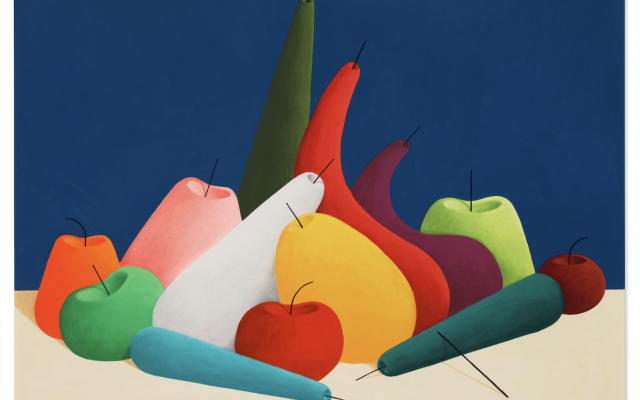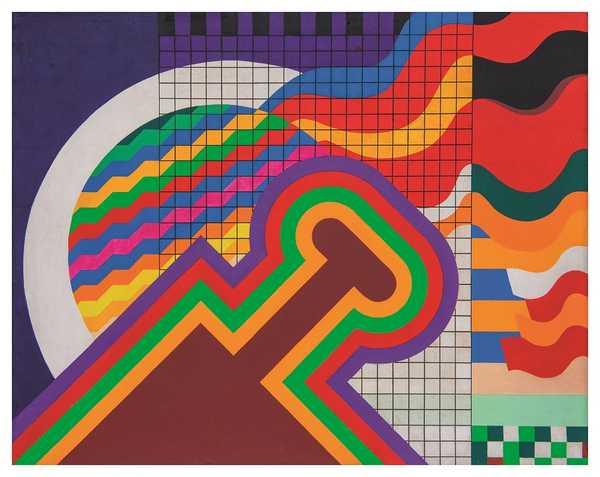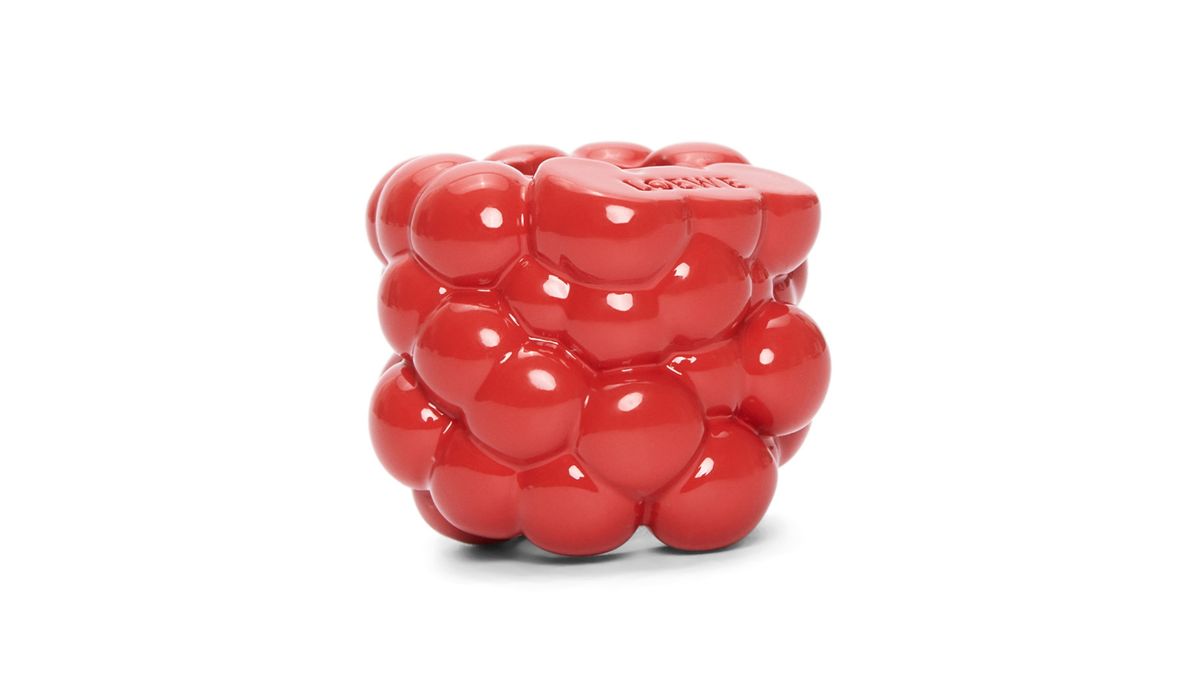Cumulonimbus capillatus incus
2008 - Sculpture (Sculpture)
42.7 x 42.7cm
Evariste Richer
Cumulocumulonimbus capillatus incus functions on the mode of a mise en abîme: it is a cube composed with 8000 dice. The work plays with chance, each installation produces a renewed visual combination. Robert Filliou said that Eins. Un. One… (16000 dice spread on the floor, 1984) “can materialise, materialises and will materialise with no limit to the most diverse forms or combination of forms.” Richers’ sculpture acts like an encoded and pixellated image of an individual according to different layers of meaning: the weight of the work is equivalent to that of an average man (76kg); the colours of the dice recall those used in diagrams representing a codified human DNA; every choice that mankind has to make could be imagined as a roll of dice. The title of this sculpture refers to a cloud that provokes very destructive hail and thunderstorms. The sculpture is as fragile and threatening as this meteorological phenomenon – dislocation and explosion loom. In his work, the artist creates assocations between dice, hailstones, meteorites. Different levels of meaning (mankind, the cliCmate, games) are crystallised in this artwork according to concatenation logic that creates a whole. The artist links the individual and the atmosphere, microcosm and macrocosm, in a manner close in spirit to the sociologist Edgar Morin’s concept of complexity (etymologically meaning “what is woven together”), as a web of interlacing.
Evariste Richer constantly invents new standards for measurement which are mostly objects to prompt the spectator’s potential investigations: avalanche probes, a meter drawn from memory, a meter with no measurements… Meteorology, science, magic, mineralogy, photography, optics are his preferred terrains. The artist reveals meaning through displacements, changes of state such as the physical occurrence of sublimation (matter transforming from solid to gas). In Ecran (Screen, 2008), the weave of a projection screen is blown-up full-scale and takes over the entire room. Evariste Richer makes visible these micro perforations which are usually hidden by the film being projected; he reveals the infra small and ghostly. Blow up (2003), a tennis ball which has been turned in on itself, could stand as an allegory for sedimentation and concatenation. The concentration of meaning and gesture produces the artwork. The constant shifting between the cosmic and the infra small brings together knowledge and observation, certainties and the poetry of art. A piece from a meteorite can become a dice ( Médéorite , 2008), a dice turning at high speed can become an illustration of the energy principle ( Le grêlon noir /The Black Hailstone, 2008). Crystallisation – which was defined by Stendhal as feelings born in the imagination that become attached to an object to transfigure it – is the base of Richer’s work. Evariste Richer was born in 1969 in Montpellier, France. He lives and works in Paris.
Colors:
Related works sharing similar palette
» see more

© » ART & OBJECT
9 Picks from New York’s Major Fall Auctions | Art & Object Skip to main content Subscribe to our free e-letter! Webform Your Email Address Role Art Collector/Enthusiast Artist Art World Professional Academic Country USA Afghanistan Albania Algeria American Samoa Andorra Angola Anguilla Antarctica Antigua & Barbuda Argentina Armenia Aruba Ascension Island Australia Austria Azerbaijan Bahamas Bahrain Bangladesh Barbados Belarus Belgium Belize Benin Bermuda Bhutan Bolivia Bosnia & Herzegovina Botswana Bouvet Island Brazil British Indian Ocean Territory British Virgin Islands Brunei Bulgaria Burkina Faso Burundi Cambodia Cameroon Canada Canary Islands Cape Verde Caribbean Netherlands Cayman Islands Central African Republic Ceuta & Melilla Chad Chile China Christmas Island Clipperton Island Cocos (Keeling) Islands Colombia Comoros Congo - Brazzaville Congo - Kinshasa Cook Islands Costa Rica Croatia Cuba Curaçao Cyprus Czechia Côte d’Ivoire Denmark Diego Garcia Djibouti Dominica Dominican Republic Ecuador Egypt El Salvador Equatorial Guinea Eritrea Estonia Eswatini Ethiopia Falkland Islands Faroe Islands Fiji Finland France French Guiana French Polynesia French Southern Territories Gabon Gambia Georgia Germany Ghana Gibraltar Greece Greenland Grenada Guadeloupe Guam Guatemala Guernsey Guinea Guinea-Bissau Guyana Haiti Heard & McDonald Islands Honduras Hong Kong SAR China Hungary Iceland India Indonesia Iran Iraq Ireland Isle of Man Israel Italy Jamaica Japan Jersey Jordan Kazakhstan Kenya Kiribati Kosovo Kuwait Kyrgyzstan Laos Latvia Lebanon Lesotho Liberia Libya Liechtenstein Lithuania Luxembourg Macao SAR China Madagascar Malawi Malaysia Maldives Mali Malta Marshall Islands Martinique Mauritania Mauritius Mayotte Mexico Micronesia Moldova Monaco Mongolia Montenegro Montserrat Morocco Mozambique Myanmar (Burma) Namibia Nauru Nepal Netherlands Netherlands Antilles New Caledonia New Zealand Nicaragua Niger Nigeria Niue Norfolk Island Northern Mariana Islands North Korea North Macedonia Norway Oman Outlying Oceania Pakistan Palau Palestinian Territories Panama Papua New Guinea Paraguay Peru Philippines Pitcairn Islands Poland Portugal Puerto Rico Qatar Romania Russia Rwanda Réunion Samoa San Marino Saudi Arabia Senegal Serbia Seychelles Sierra Leone Singapore Sint Maarten Slovakia Slovenia Solomon Islands Somalia South Africa South Georgia & South Sandwich Islands South Korea South Sudan Spain Sri Lanka St...

© » TATE EXHIBITIONS
Casablanca Art School | Tate St Ives A major exhibition about the artists of the renowned Casablanca Art School Tate St Ives will be the first museum in the UK to explore the intense period of artistic rebirth that followed Morocco’s independence, forged by the experimental teaching methods of the Casablanca Art School in the 1960s and 1970s...

© » SLASH PARIS
Caroline Bachmann — Le Matin — Le Crédac, Centre d’art contemporain d’Ivry — Exhibition — Slash Paris Login Newsletter Twitter Facebook Caroline Bachmann — Le Matin — Le Crédac, Centre d’art contemporain d’Ivry — Exhibition — Slash Paris English Français Home Events Artists Venues Magazine Videos Back Caroline Bachmann — Le Matin Exhibition Drawing, installation, painting Closing Caroline Bachmann, Le Matin, 2022 Detail...
Related artist(s) to: Evariste Richer » Joachim Koester, » Ryan Gander, » Alexander Gutke, » Frac Lorraine, » Giuseppe Gabellone, » Hans Schabus, » Jason Dodge, » Joëlle Tuerlinckx, » La Galerie, » Laurent Montaron
» see more

© » KADIST
Joachim Koester
2007Tarantism is the name of disease which appeared in southern Italy, resulting from the bite of a spider called Tarantula...

© » KADIST
Laurent Montaron
2006This film refers directly and fictionally to one of the first media dramas: the burning of the Zeppelin aircraft LZ 129 Hindenburg as it landed in New York in 1937...
Related works found in the same semantic group
» see more

© » KADIST
Didem Pekün
2016Of Dice and Men is a video diary-essay: in it, Didem Pekün’s daily life and political events are intertwined, just as they are in our individual realities...

© » KADIST
Tobias Fike & Matthew Harris
2013Facing one another, each projection screen of the work Food Fight respectively features Tobias Fike and Matthew Harris preparing multi-course meals at a kitchen counter...

© » WALLPAPER*
Valentine’s Day 2024: try five new ways to share the love | Wallpaper This bag charm – a raspberry ‘dice’ in brass and enamel, £100, by Loewe – is a cute alternative to hearts and flowers on Valentine’s Day 2024 (Image credit: Courtesy Loewe) By Caragh McKay published 9 February 2024 We’re reconsidering our options for Valentine’s Day 2024...




